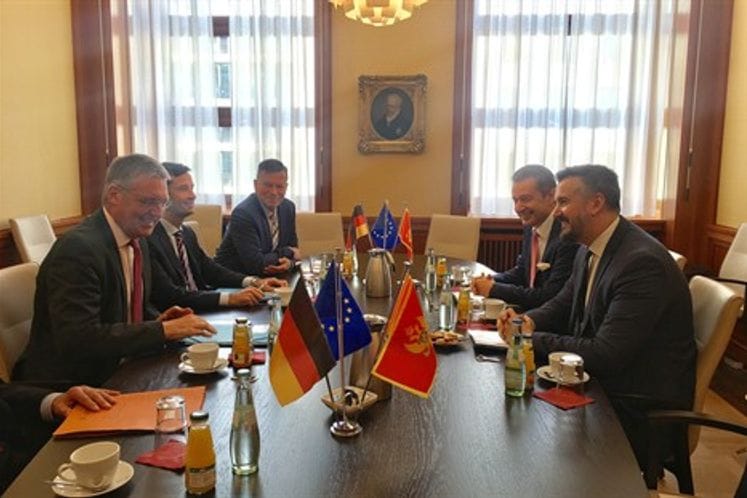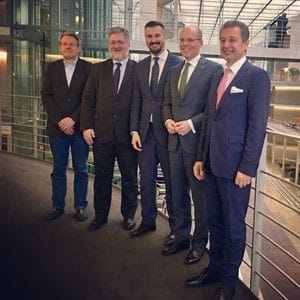- Government of Montenegro
Berlin: Montenegro is making steady progress towar...
Berlin: Montenegro is making steady progress towards EU membership

 Berlin,
Germany (9 March 2017) -- During the nearly five years of running the
accession negotiations and implementation of fundamental reforms, Montenegro
has shown a real commitment to European values and has made a significant
progress not only towards membership in the EU, but also towards building a
society based on European standards and quality of life. This was assessed at
meetings attended by Minister of European Affairs Aleksandar Andrija Pejović, during his two-day visit to Berlin.
Berlin,
Germany (9 March 2017) -- During the nearly five years of running the
accession negotiations and implementation of fundamental reforms, Montenegro
has shown a real commitment to European values and has made a significant
progress not only towards membership in the EU, but also towards building a
society based on European standards and quality of life. This was assessed at
meetings attended by Minister of European Affairs Aleksandar Andrija Pejović, during his two-day visit to Berlin.
Minister Pejović met with Secretary of State to the German Federal Ministry for Foreign Affairs Markus Ederer, Deputy/Advisor to the German Chancellor Franz Neueder, President and members of the Parliamentary Friendship Group with Southeast Europe in the Bundestag Stephan Albani (CDU), Peter Beyer (CDU) and Dirk Vöpel (SPD), as well as the Deputy Secretary General and Head of the Department for European and International Cooperation of the Konrad Adenauer Federation, Dr. Gerhard Wahlers.
The Minister informed his interlocutors about the current state of the negotiating process, saying that he expects additional chapters to be opened by the end of the year. Thereby, by this is meant chapters in which Montenegro has good internal capacity, such as those relating to the free movement of goods and regional policy and coordination of structural instruments, so we will be able to close some of the chapters, as is Chapter 30. External relations.
Minister Pejović thanked Germany for the support provided to Montenegro in the negotiating process, especially in the field of judicial reform. He also welcomed the very important role of this country in the European integration of the Western Balkans, which is concreted through the Berlin process, pointing out that the initiative has already resulted in significant progress in the field of economic development of the region, especially through the infrastructure connecting countries of the region, promoting cooperation in the field of science and social dialogue, and resolving outstanding political issues.
Secretary of State Markus Ederer said that Germany is strongly committed to reception of the Western Balkans into the EU, stressing that the process of European integration and membership perspective contribute to stability and democratic development in this part of Europe. In this domain, he said that Germany supports progress towards membership in accordance with the results achieved, pointing out that, in this part, Montenegro has a significant advantage compared to other countries in the region.
Deputy/Advisor to the German Chancellor Franz Neueder said that through reforms in all areas, especially in the field of rule of law, Montenegro showed that it represents a mature and responsible society that is making decisively and steady progress towards EU membership. He emphasised his satisfaction that reforms have given concrete results in practice, but also stressed that the Montenegrin society has some more work to do to full membership. In this context, he said that Germany will continue to provide political and expert support to Montenegro, adding that the quality and effective preparation for the future membership is the objective of both Montenegro and the EU.
President Stephan Albani and members of the Parliamentary Friendship Group with Southeast Europe in the Bundestag Peter Beyer and Dirk Vöpel greeted the results achieved in the field of rule of law, economics, and resolving bilateral issues and regional cooperation, pointing out that Germany and the EU will continue to monitor and support progress of Montenegro and other Western Balkan countries. The role of our country in the development of good neighborly relations was particularly praised, with emphasis on the fact that such a policy made a significant contribution to maintain stability and intensify cooperation in the direction of economic and overall development of the region.
During the discussion with Deputy Secretary General and Head of the Department for European and International Cooperation of the Konrad Adenauer Federation, Dr. Gerhard Wahlers, both officials expressed satisfaction with previous cooperation between the Ministry of European Affairs and the Foundation, and agreed to intensify it in the future, especially in the context of implementation of the Strategy of Information.
